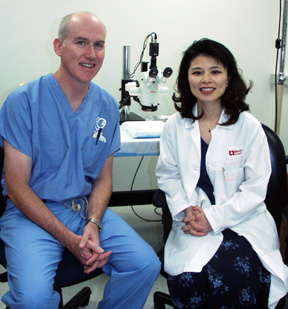 |
Timothy Baxter, M.D., left, and Wanfen Xiong, M.D., Ph.D. |
Results of the research were released June 9 in Baltimore at the annual meeting of the Society for Vascular Surgery, the national organization that includes more than 2,400 vascular surgeons from around the country.
The study determined that Marfan syndrome mice who received doxycycline in their drinking water lived nearly twice as long as mice who did not receive the drug.
It also found that doxycycline blocks the proteins that break down the aorta and reduces elastin degradation, which is believed to play an important role in aneurysms.
“This is an important development,” said B. Timothy Baxter, M.D., professor of surgery at UNMC and the prinicipal investigator on the study. “We need to do more work to characterize exactly how doxycycline works in mice, but then we should be in a position to consider doing clinical trials in humans.”
Marfan syndrome is an inherited condition that affects the connective tissue, which holds the body together and provides a framework for growth and development. Because connective tissue is found throughout the body, Marfan syndrome can affect many body systems, including the skeleton, eyes, heart and blood vessels, nervous system, skin and lungs.
One of the most serious consequences of Marfan syndrome causes the wall of the aorta, the large artery that carries blood from the heart to the rest of the body, to become weakened and stretch, a process called aortic dilation. Aortic dilation increases the risk that the aorta will tear or rupture, causing serious heart problems or sometimes sudden death.
Marfan syndrome affects about 1 in 10,000 individuals and perhaps as many as 1 in 3,000-5,000. Estimates suggest that at least 200,000 people in the United States have Marfan syndrome.
“Marfan syndrome has been a progressive disease with high morbidity,” Dr. Baxter said. “This really offers patients the future prospect of preventing the serious vascular problems that accompany the disease.”
Dr. Baxter stressed that the work was accomplished in an animal model that mimics the human disease process but the drug has not been used yet in patients with Marfan syndrome.
Dr. Baxter said many Marfan syndrome patients need more than one operation to fix the aorta problems, which typically surface between age 30 and 40.
In the past, beta blockers have been used to lower blood pressure and slow the heart rate in an attempt to delay the aorta’s enlargement, Dr. Baxter said.
However, beta blockers provide only modest benefit to patients and the side effects caused by the drugs have a negative impact on a patient’s quality of life.
Losartan is another drug used for blood pressure control that appears to prevent progression of the changes associated with Marfan syndrome. A clinical trial to test the effectiveness of losartan was started three months ago at Johns Hopkins University, he said. One of the important questions that needs to be answered now is whether or not doxycycline could add to the effects of losartan.
“The results from the mouse studies suggest that if you start treating patients in adolesence with doxycycline, you could, theoretically, prevent the need for surgery. This would truly be a breakthrough for these patients,” Dr. Baxter said. One of the benefits of doxycycline is that it has few side effects in adolescents and adults. It is not used in children since it can cause staining of the teeth.
The study was done under a grant from the National Heart, Lung and Blood Institute, one of the divisions that make up the National Institutes of Health (NIH). In the study, mice were given doxycycline in their drinking water in a dose that would be equivalent to the normal human dose of 200 milligrams per day.
Doxycycline, which comes in a pill form, is a member of the tetracycline antibiotics group. It is frequently used to treat chronic prostatitis, sinusitis, syphilis, chlamydia, pelvic inflammatory disease, acne and rosacea.
In addition, it is used in the treatment and prevention of anthrax and malaria.
Dr. Baxter noted that at least two other UNMC researchers are using doxycycline in their research. They are James O’Dell, M.D., who is researching rheumatoid arthritis, and Jeffrey Payne, D.D.S., who is looking into gum disease. In addition, Dr. Baxter said UNMC is holding a continuing education conference on Oct. 5 to provide further discussion of doxycycline.
Dr. Baxter praised the work of Wanfen Xiong, Ph.D., assistant professor of surgery, who helped design the trial, analyze the results and present the information in Baltimore.